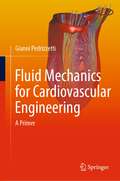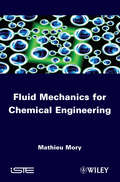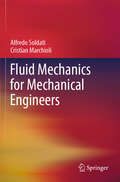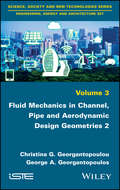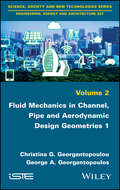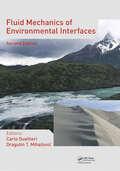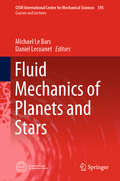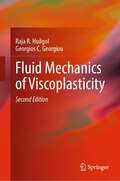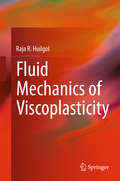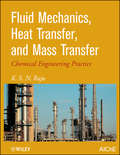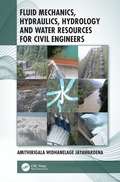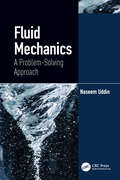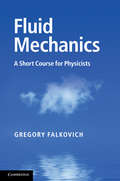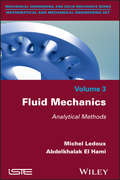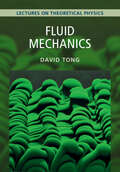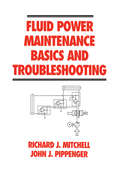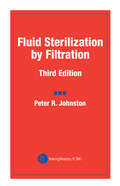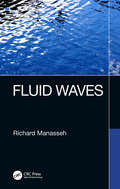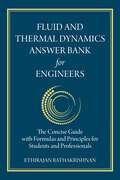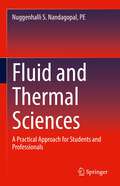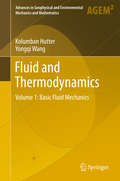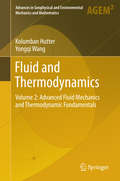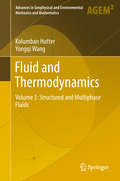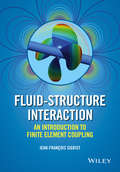- Table View
- List View
Fluid Mechanics for Cardiovascular Engineering: A Primer
by Gianni PedrizzettiThis book provides a guiding thread between the distant fields of fluid mechanics and clinical cardiology. Well rooted in the science of fluid dynamics, it drives the reader across progressively more realistic scenarios up to the complexity of routine medical applications. Based on the author’s 25 years of collaborations with cardiologists, it helps engineers learn communicating with clinicians, yet maintaining the rigor of scientific disciplines. This book starts with a description of the fundamental elements of fluid dynamics in large blood vessels. This is achieved by introducing a rigorous physical background accompanied by examples applied to the circulation, and by presenting classic and recent results related to the application of fluid dynamics to the cardiovascular physiology. It then explores more advanced topics for a physics-based understanding of phenomena effectively encountered in clinical cardiology. It stands as an ideal learning resource for physicists and engineers working in cardiovascular fluid dynamics, industry engineers working on biomedical/cardiovascular technology, and students in bio-fluid dynamics. Written with a concise style, this textbook is accessible to a broad readership, including students, physical scientists and engineers, offering an entry point into this multi-disciplinary field. It includes key concepts exemplified by illustrations using cutting-edge imaging, references to modelling and measurement technologies, and includes unique original insights.
Fluid Mechanics for Chemical Engineering
by Mathieu MoryThe book aims at providing to master and PhD students the basic knowledge in fluid mechanics for chemical engineers. Applications to mixing and reaction and to mechanical separation processes are addressed.The first part of the book presents the principles of fluid mechanics used by chemical engineers, with a focus on global theorems for describing the behavior of hydraulic systems. The second part deals with turbulence and its application for stirring, mixing and chemical reaction. The third part addresses mechanical separation processes by considering the dynamics of particles in a flow and the processes of filtration, fluidization and centrifugation. The mechanics of granular media is finally discussed.
Fluid Mechanics for Mechanical Engineers
by Cristian Marchioli Alfredo SoldatiThis textbook describes the fundamentals of the phenomena of fluid dynamics in the context of engineering instances. It is designed to replace introductory books and notes on the subject for first-level engineering courses as well as higher-level courses or for professional use. The use of this book requires the basic knowledge of mathematics and physics normally delivered in the early years of undergraduate study. However, the extensive use of examples and solved exercises proposes a parallel intuitive route to understanding the necessary mathematical formalisms. It proves that a new fluid dynamics text should not contain new ideas or formalisms, but should present the material in a modern and intuitive way. The approach chosen is primarily practical, so that that readers can practice by solving the proposed problems and examples in order to be prepared to solve the new problems they will encounter in their academic and professional activities. It serves as a teaching tool for coursesin basic fluid dynamics, advanced fluid dynamics, turbulence, and aerodynamics.
Fluid Mechanics in Channel, Pipe and Aerodynamic Design Geometries
by Christina G. Georgantopoulou George A. GeorgantopoulosFluid mechanics is an important scientific field with various industrial applications for flows or energy consumption and efficiency issues. This book has as main aim to be a textbook of applied knowledge in real fluids as well as to the Hydraulic systems components and operation, with emphasis to the industrial or real life problems for piping and aerodynamic design geometries. Various problems will be presented and analyzed through this book.
Fluid Mechanics in Channel, Pipe and Aerodynamic Design Geometries
by Christina G. Georgantopoulou George A. GeorgantopoulosFluid mechanics is an important scientific field with various industrial applications for flows or energy consumption and efficiency issues. This book has as main aim to be a textbook of applied knowledge in real fluids as well as to the Hydraulic systems components and operation, with emphasis to the industrial or real life problems for piping and aerodynamic design geometries. Various problems will be presented and analyzed through this book.
Fluid Mechanics of Environmental Interfaces
by Sajjan G. ShivaEnvironmental Fluid Mechanics (EFM) studies the motion of air and water at several different scales, the fate and transport of species carried along by these fluids, and the interactions among those flows and geological, biological, and engineered systems. EFM emerged some decades ago as a response to the need for tools to study problems of flow an
Fluid Mechanics of Planets and Stars (CISM International Centre for Mechanical Sciences #595)
by Michael Le Bars Daniel LecoanetThis book explores the dynamics of planetary and stellar fluid layers, including atmospheres, oceans, iron cores, and convective and radiative zones in stars, describing the different theoretical, computational and experimental methods used to study these problems in fluid mechanics, including the advantages and limitations of each method for different problems. This scientific domain is by nature interdisciplinary and multi-method, but while much effort has been devoted to solving open questions within the various fields of mechanics, applied mathematics, physics, earth sciences and astrophysics, and while much progress has been made within each domain using theoretical, numerical and experimental approaches, cross-fertilizations have remained marginal. Going beyond the state of the art, the book provides readers with a global introduction and an up-to-date overview of relevant studies, fully addressing the wide range of disciplines and methods involved. The content builds on the CISM course “Fluid mechanics of planets and stars”, held in April 2018, which was part of the research project FLUDYCO, supported by the European Research Council (ERC) under the European Union's Horizon 2020 research and innovation program.
Fluid Mechanics of Viscoplasticity
by Raja R. Huilgol Georgios C. GeorgiouThis book considers the kinematics and dynamics of the flows of fluids exhibiting a yield stress. Continuum mechanics governing the fluid mechanics is described. Two chapters are dedicated to analytical solutions to several steady and unsteady flows of viscoplastic fluids, including flows with pressure-dependent rheological parameters. Perturbation methods, variational inequalities to solve fluid flow problems, and the use of energy methods are discussed. Numerical modeling using augmented Lagrangian, operator splitting, finite difference, and lattice Boltzmann methods are employed.The second edition provides new sections on flows of yield stress fluids with pressure-dependent rheological parameters, on flows with wall slip, and on deriving the fundamental equations for Boltzmann lattice materials. Furthermore new material on the lubrication approximation and applications of finite differences has been added.
Fluid Mechanics of Viscoplasticity
by Raja R. HuilgolIn this book, we shall consider the kinematics and dynamics of the flows of fluids exhibiting a yield stress. To highlight the principal characteristics of such fluids, the first chapter emphasizes the role played by the yield stress. Next, a careful description of the continuum mechanics behind the constitutive equations for incompressible and compressible viscoplastic fluids is given in Chapters 2-4. In Chapters 5 and 6 analytical solutions to several steady and unsteady flows of Bingham fluids are presented. The subsequent Chapters 7-10 are concerned with the development of variational principles and their numerical solutions, along with perturbation methods which play a significant role in numerical simulations.
Fluid Mechanics, Heat Transfer, and Mass Transfer: Chemical Engineering Practice
by K. S. RajuThis broad-based book covers the three major areas of Chemical Engineering. Most of the books in the market involve one of the individual areas, namely, Fluid Mechanics, Heat Transfer or Mass Transfer, rather than all the three. This book presents this material in a single source. This avoids the user having to refer to a number of books to obtain information. Most published books covering all the three areas in a single source emphasize theory rather than practical issues. This book is written with emphasis on practice with brief theoretical concepts in the form of questions and answers, not adopting stereo-typed question-answer approach practiced in certain books in the market, bridging the two areas of theory and practice with respect to the core areas of chemical engineering. Most parts of the book are easily understandable by those who are not experts in the field. Fluid Mechanics chapters include basics on non-Newtonian systems which, for instance find importance in polymer and food processing, flow through piping, flow measurement, pumps, mixing technology and fluidization and two phase flow. For example it covers types of pumps and valves, membranes and areas of their use, different equipment commonly used in chemical industry and their merits and drawbacks. Heat Transfer chapters cover the basics involved in conduction, convection and radiation, with emphasis on insulation, heat exchangers, evaporators, condensers, reboilers and fired heaters. Design methods, performance, operational issues and maintenance problems are highlighted. Topics such as heat pipes, heat pumps, heat tracing, steam traps, refrigeration, cooling of electronic devices, NOx control find place in the book. Mass transfer chapters cover basics such as diffusion, theories, analogies, mass transfer coefficients and mass transfer with chemical reaction, equipment such as tray and packed columns, column internals including structural packings, design, operational and installation issues, drums and separators are discussed in good detail. Absorption, distillation, extraction and leaching with applications and design methods, including emerging practices involving Divided Wall and Petluk column arrangements, multicomponent separations, supercritical solvent extraction find place in the book.
Fluid Mechanics, Hydraulics, Hydrology and Water Resources for Civil Engineers
by Amithirigala Widhanelage JayawardenaOne of the core areas of study in civil engineering concerns water that encompasses fluid mechanics, hydraulics and hydrology. Fluid mechanics provide the mathematical and scientific basis for hydraulics and hydrology that also have added empirical and practical contents. The knowledge contained in these three subjects is necessary for the optimal and equitable management of this precious resource that is not always available when and where it is needed, sometimes with conflicting demands. The objective of Fluid Mechanics, Hydraulics, Hydrology and Water Resources for Civil Engineers is to assimilate these core study areas into a single source of knowledge. The contents highlight the theory and applications supplemented with worked examples and also include comprehensive references for follow-up studies. The primary readership is civil engineering students who would normally go through these core subject areas sequentially spread over the duration of their studies. It is also a reference for practicing civil engineers in the water sector to refresh and update their skills.
Fluid Mechanics: A Problem-Solving Approach
by Naseem UddinFluid Mechanics: A Problem-Solving Approach provides a clear distinction between integral formulation and the different formulation of conservation law. Including a detailed discussion on pipe flow correlations, entrance length correlations, and plotting of Moody diagram, the book works through the comprehensive coverage of fluid mechanics with a gradual introduction of theory in a straightforward, practical approach. The book includes numerous end-of-chapter problems to enhance student understanding and different solving approaches. It features chapters on nanofluids, jets, waves in ocean and rivers, boundary layer separation, and Thwaites integral method, which are not typically covered in an introductory course. Features Provides a comprehensive treatment of fluid mechanics from the basic concepts to in-depth application problems. Covers waves and tsunamis. Offers two distinct chapters on jet flows and turbulent flows. Includes numerous end-of-chapter problems. Includes a Solutions Manual and MAPLE worksheets for instructor use. The book is intended for senior undergraduate mechanical and civil engineering students taking courses in fluid mechanics. The eBook+ version includes the following enhancements: 3 videos placed throughout the text to help apply real-world examples to concepts of Newtonian vs. Non-Newtonian fluids, vortices, and additional information on surface tension. Pop-up explanations of selected concepts as interactive flashcards in each chapter. Quizzes within chapters to help readers refresh their knowledge.
Fluid Mechanics: A Short Course For Physicists
by Gregory FalkovichThe multidisciplinary field of fluid mechanics is one of the most actively developing fields of physics, mathematics and engineering. <P><P>In this book, the fundamental ideas of fluid mechanics are presented from a physics perspective. Using examples taken from everyday life, from hydraulic jumps in a kitchen sink to Kelvin–Helmholtz instabilities in clouds, the book provides readers with a better understanding of the world around them. It teaches the art of fluid-mechanical estimates and shows how the ideas and methods developed to study the mechanics of fluids are used to analyze other systems with many degrees of freedom in statistical physics and field theory.<P> Aimed at undergraduate and graduate students, the book assumes no prior knowledge of the subject and only a basic understanding of vector calculus and analysis. It contains 32 exercises of varying difficulties, from simple estimates to elaborate calculations, with detailed solutions to help readers understand fluid mechanics.<P> Presents a unique perspective on fluid mechanics stressing its links with other branches of physics.<P> Examples and exercises are taken from everyday life, from the kitchen sink to sailing and flying, to give readers a better appreciation of the subject.<P> Teaches the art of physical estimates as applied to fluid mechanics.<P>
Fluid Mechanics: A Short Course for Physicists
by Gregory FalkovichThe multidisciplinary field of fluid mechanics is one of the most actively developing fields of physics, mathematics and engineering. In this book, the fundamental ideas of fluid mechanics are presented from a physics perspective. Using examples taken from everyday life, from hydraulic jumps in a kitchen sink to Kelvin-Helmholtz instabilities in clouds, the book provides readers with a better understanding of the world around them. It teaches the art of fluid-mechanical estimates and shows how the ideas and methods developed to study the mechanics of fluids are used to analyze other systems with many degrees of freedom in statistical physics and field theory. Aimed at undergraduate and graduate students, the book assumes no prior knowledge of the subject and only a basic understanding of vector calculus and analysis. It contains 32 exercises of varying difficulties, from simple estimates to elaborate calculations, with detailed solutions to help readers understand fluid mechanics.
Fluid Mechanics: Analytical Methods
by Abdelkhalak El Hami Michel LedouxThe book aims to provide an efficient methodology of solving a fluid mechanics problem. It aims to meet different objectives of the student, the future engineer or scientist. Using simple sizing calculations, and more advanced analytical calculations, the book covers all the essential numerical approaches for solving complex practical problems.
Fluid Mechanics: Lectures on Theoretical Physics
by David TongTake anything in the universe, put it in a box, and heat it up. Regardless of what you start with, the motion of the substance will be described by the equations of fluid mechanics. This remarkable universality is the reason why fluid mechanics is important. The key equation of fluid mechanics is the Navier-Stokes equation. This textbook starts with the basics of fluid flows, building to the Navier-Stokes equation while explaining the physics behind the various terms and exploring the astonishingly rich landscape of solutions. The book then progresses to more advanced topics, including waves, fluid instabilities, and turbulence, before concluding by turning inwards and describing the atomic constituents of fluids. It introduces ideas of kinetic theory, including the Boltzmann equation, to explain why the collective motion of 1023 atoms is, under the right circumstances, always governed by the laws of fluid mechanics.
Fluid Power Maintenance Basics and Troubleshooting
by Richard J. Mitchell John J. PippengerThis unique single-source reference-the first book of its kind to address systematically the problems involved in the field-offers comprehensive coverage of hydraulic system troubleshooting and encourages change in the trial-and-error methods common in rectifying problems and restoring system downtime, furnishing a new paradigm for troubleshooting
Fluid Sterilization by Filtration
by Peter R. JohnstonCompletely revised and updated, Fluid Sterilization by Filtration, Third Edition discusses the use of gas and fluid filtration systems in sterilization technology. Packed with information useful to both the novice and the expert, it includes line-drawing illustrations, filtration setups, and plots of math functions illustrating fluid flows through
Fluid Waves
by Richard ManassehThe book derives the mathematical basis for the most encountered waves in science and engineering. It gives the basis to undertake calculations required for important occupations such as maritime engineering, climate science, urban noise control, and medical diagnostics. The book initiates with fluid dynamics basis with subsequent chapters covering surface gravity waves, sound waves, internal gravity waves and waves in rotating fluids, and details basic phenomena such as refraction. Thereafter, specialized application chapters include description of specific contemporary problems. All concepts are supported by narrative examples, illustrations, and case studies. Features:- Explains the basis of wave mechanics in fluid systems. Provides tools for the analysis of water waves, sound waves, internal gravity, and rotating fluid waves through different examples. Includes comprehensible mathematical derivations at the expense of fewer theoretical topics. Reviews cases describable by linear theory and cases requiring nonlinear and wave-interaction theories. Supports concepts with narrative examples, illustrations, and case studies. This book aims at Senior Undergraduates/Graduate students and Researchers in Fluid Mechanics, Applied Mathematics, Mechanical Engineering, Civil Engineering, and Physical Oceanography.
Fluid and Thermal Dynamics Answer Bank for Engineers: The Concise Guide with Formulas and Principles for Students and Professionals
by Ethirajan RathakrishnanThis book provides the essence of aerodynamics, fluid mechanics, experimental methods, gas dynamics, high enthalpy gas dynamics, helicopter aerodynamics, heat transfer, and thermodynamics, describing the underlying principles of these subjects before list
Fluid and Thermal Sciences: A Practical Approach for Students and Professionals
by Nuggenhalli S. Nandagopal, PEThis text provides a clear understanding of the fundamental principles of thermal and fluid sciences in a concise manner in a rigorous yet easy to follow language and presentation. Elucidation of the principles is further reinforced by examples and practice problems with detailed solutions. Firmly grounded in the fundamentals, the book maximizes readers’ capacity to take on new problems and challenges in the field of fluid and thermal sciences with confidence and conviction. Standing also as a ready reference and review of the essential theories and their applications in fluid and thermal sciences, the book is applicable for undergraduate mechanical and chemical engineering students, students in engineering technology programs, as well as practicing engineers preparing for the engineering license exams (FE and PE) in USA and abroad.Explains the concepts and theory with a practical approach that readers can easily absorb;Provides the just the right amount of theoretical and mathematical background needed, making it less intimidating for the reader;Covers fluid and thermal sciences in a straight-forward yet comprehensive manner facilitating a good understanding of the subject matter;Includes a wide spectrum and variety of problems along with numerous illustrative solved examples and many practice problems with solutions.
Fluid and Thermodynamics
by Kolumban Hutter Yongqi WangThis first volume discusses fluid mechanical concepts and their applications to ideal and viscous processes. It describes the fundamental hydrostatics and hydrodynamics, and includes an almanac of flow problems for ideal fluids. The book presents numerous exact solutions of flows in simple configurations, each of which is constructed and graphically supported. It addresses ideal, potential, Newtonian and non-Newtonian fluids. Simple, yet precise solutions to special flows are also constructed, namely Blasius boundary layer flows, matched asymptotics of the Navier-Stokes equations, global laws of steady and unsteady boundary layer flows and laminar and turbulent pipe flows. Moreover, the well-established logarithmic velocity profile is criticised.
Fluid and Thermodynamics
by Kolumban Hutter Yongqi WangIn this book fluid mechanics and thermodynamics (F&T) are approached as interwoven, not disjoint fields. The book starts by analyzing the creeping motion around spheres at rest: Stokes flows, the Oseen correction and the Lagerstrom-Kaplun expansion theories are presented, as is the homotopy analysis. 3D creeping flows and rapid granular avalanches are treated in the context of the shallow flow approximation, and it is demonstrated that uniqueness and stability deliver a natural transition to turbulence modeling at the zero, first order closure level. The difference-quotient turbulence model (DQTM) closure scheme reveals the importance of the turbulent closure schemes' non-locality effects. Thermodynamics is presented in the form of the first and second laws, and irreversibility is expressed in terms of an entropy balance. Explicit expressions for constitutive postulates are in conformity with the dissipation inequality. Gas dynamics offer a first application of combined F&T. The book is rounded out by a chapter on dimensional analysis, similitude, and physical experiments.
Fluid and Thermodynamics: Volume 2: Advanced Fluid Mechanics And Thermodynamic Fundamentals (Advances In Geophysical And Environmental Mechanics And Mathematics Ser.)
by Kolumban Hutter Yongqi WangThis third volume describes continuous bodies treated as classical (Boltzmann) and spin (Cosserat) continua or fluid mixtures of such bodies. It discusses systems such as Boltzmann continua (with trivial angular momentum) and Cosserat continua (with nontrivial spin balance) and formulates the balance law and deformation measures for these including multiphase complexities. Thermodynamics is treated in the spirit of Müller–Liu: it is applied to Boltzmann-type fluids in three dimensions that interact with neighboring fluids on two-dimensional contact surfaces and/or one-dimensional contact lines. For all these situations it formulates the balance laws for mass, momenta, energy, and entropy. Further, it introduces constitutive modeling for 3-, 2-, 3-d body parts for general processes and materially objective variable sets and their reduction to equilibrium and non-equilibrium forms. Typical (reduced) fluid spin continua are liquid crystals. Prominent nematic examples of these include the Ericksen–Leslie–Parodi (ELP) formulation, in which material particles are equipped with material unit vectors (directors). Nematic liquid crystals with tensorial order parameters of rank 1 to n model substructure behavior better, and for both classes of these, the book analyzes the thermodynamic conditions of consistency. Granular solid–fluid mixtures are generally modeled by complementing the Boltzmann laws with a balance of fluctuation (kinetic) energy of the particles. The book closes by presenting a full Reynolds averaging procedure that accounts for higher correlation terms e.g. a k-epsilon formulation in classical turbulence. However, because the volume fraction is an additional variable, the theory also incorporates ‘k-epsilon equations’ for the volume fraction.
Fluid-Structure Interaction
by Jean-Francois SigristFluid-Structure Interaction: An Introduction to Finite Element Coupling fulfils the need for an introductive approach to the general concepts of Finite and Boundary Element Methods for FSI, from the mathematical formulation to the physical interpretation of numerical simulations. Based on the author's experience in developing numerical codes for industrial applications in shipbuilding and in teaching FSI to both practicing engineers and within academia, it provides a comprehensive and self-contained guide that is geared toward both students and practitioners of mechanical engineering. Composed of six chapters, Fluid-Structure Interaction: An Introduction to Finite Element Coupling progresses logically from formulations and applications involving structure and fluid dynamics, fluid and structure interactions and opens to reduced order-modelling for vibro-acoustic coupling. The author describes simple yet fundamental illustrative examples in detail, using analytical and/or semi-analytical formulation & designed both to illustrate each numerical method and also to highlight a physical aspect of FSI. All proposed examples are simple enough to be computed by the reader using standard computational tools such as MATLAB, making the book a unique tool for self-learning and understanding the basics of the techniques for FSI, or can serve as verification and validation test cases of industrial FEM/BEM codes rendering the book valuable for code verification and validation purposes.
